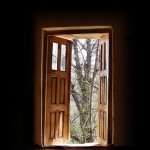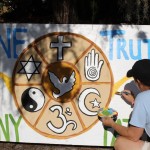Thank you Rev. Emily for allowing me to share this kick-ass post originally shared on The Huffington Post!
It seems like this election season “religious liberty” is a hot topic. Rumors of its demise are all around, as are politicians who want to make sure that you know they will never do anything to intrude upon it.
I’m a religious person with a lifelong passion for civil rights, so this is of great interest to me. So much so, that I believe we all need to determine whether our religious liberties are indeed at risk. So, as a public service, I’ve come up with this little quiz. I call it “How to Determine if Your Religious Liberty Is Being Threatened in Just 10 Quick Questions.” Just pick “A” or “B” for each question.
1. My religious liberty is at risk because:
A) I am not allowed to go to a religious service of my own choosing.
B) Others are allowed to go to religious services of their own choosing.2. My religious liberty is at risk because:
A) I am not allowed to marry the person I love legally, even though my religious community blesses my marriage.
B) Some states refuse to enforce my own particular religious beliefs on marriage on those two guys in line down at the courthouse.3. My religious liberty is at risk because:
A) I am being forced to use birth control.
B) I am unable to force others to not use birth control.4. My religious liberty is at risk because:
A) I am not allowed to pray privately.
B) I am not allowed to force others to pray the prayers of my faith publicly.5. My religious liberty is at risk because:
A) Being a member of my faith means that I can be bullied without legal recourse.
B) I am no longer allowed to use my faith to bully gay kids with impunity.6. My religious liberty is at risk because:
A) I am not allowed to purchase, read or possess religious books or material.
B) Others are allowed to have access books, movies and websites that I do not like.7. My religious liberty is at risk because:
A) My religious group is not allowed equal protection under the establishment clause.
B) My religious group is not allowed to use public funds, buildings and resources as we would like, for whatever purposes we might like.8. My religious liberty is at risk because:
A) Another religious group has been declared the official faith of my country.
B) My own religious group is not given status as the official faith of my country.9. My religious liberty is at risk because:
A) My religious community is not allowed to build a house of worship in my community.
B) A religious community I do not like wants to build a house of worship in my community.10. My religious liberty is at risk because:
A) I am not allowed to teach my children the creation stories of our faith at home.
B) Public school science classes are teaching science.Scoring key:
If you answered “A” to any question, then perhaps your religious liberty is indeed at stake. You and your faith group have every right to now advocate for equal protection under the law. But just remember this one little, constitutional, concept: this means you can fight for your equality — not your superiority.
If you answered “B” to any question, then not only is your religious liberty not at stake, but there is a strong chance that you are oppressing the religious liberties of others. This is the point where I would invite you to refer back to the tenets of your faith, especially the ones about your neighbors.
In closing, no matter what soundbites you hear this election year, remember this: Religious liberty is never secured by a campaign of religious superiority. The only way to ensure your own religious liberty remains strong is by advocating for the religious liberty of all, including those with whom you may passionately disagree. Because they deserve the same rights as you. Nothing more. Nothing less.
 The Rev. Emily C. Heath is a United Church of Christ (UCC) minister serving as a pastor in southern Vermont. She also serves as the chaplain of a local fire department, and as a speaker and writer on Christian faith and social justice.
The Rev. Emily C. Heath is a United Church of Christ (UCC) minister serving as a pastor in southern Vermont. She also serves as the chaplain of a local fire department, and as a speaker and writer on Christian faith and social justice.
After growing up nominally Christian, and “spiritual but not religious”, she began to explore Christianity as a young adult. After earning degrees from Emory University and Columbia Theological Seminary she was ordained in the Presbyterian Church (USA).
In 2010, after eight years of hospital, hospice, and trauma chaplaincy, Rev. Heath transferred her ordination to the UCC in protest of the PCUSA’s continued exclusion of LGBTQ people. As a result, she believes a strong part of her pastoral call involves reaching out to the unchurched, and the de-churched, including those who have become disillusioned by religion.
A displaced Southerner, Rev. Heath lives in southern Vermont with her wife Heidi, a UCC seminarian.












